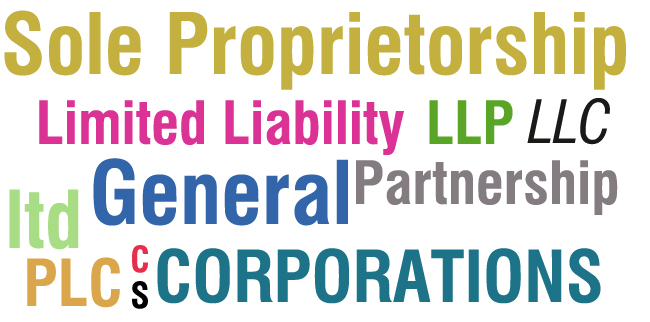This article is contributed by Jason Dirkham
Starting a business comes with many challenges that will keep you occupied for months. Finding a business name and a legal structure to work within should be among the first steps you take towards building your company. Here we are going to break down the four types of business legal structure that you can set yourself in and what their benefits are to you. Remember, you must adhere to the law when running a business so this decision is an important one for your future.
Sole Proprietorship or DBA
A DBA, or Do Business As, is the legal name given to a business that is operating under a different name from the owner but is not separate to the owner. That means you can call your company whatever you like, but as the owner, you will still be personally liable for the company, its debt, and legal obligations. As with all of the structures that we are going to discuss, a DBA has many benefits, one of which is the ease of running a sole proprietorship business. In the main, this is because you are in total control which means all finances and decisions must go through you. In addition to this, there is also a simplified tax reporting system for someone operating a DBA compared to some of the other styles of legal structure your business can utilize.
For balance sake, we should also look at what the cons of a DBA are. The main issue for anyone setting up a DBA is that they, the owner, are personally liable for everything. That means if things go wrong then the owner could end losing significant finance, their house, and other possessions.
C-Corporation
On the opposite end of the scale is the corporation, a completely separate legal entity from the owner which means they are protected from liability and debts. This also means that funds can be raised through the sale of stocks which in turn means its ownership can be transferred by stocks. The benefits of a corporation include significant tax benefits, the widest range of deductions and expenses allowed by the IRS and a corporation is the most recognized business entity worldwide.
A corporation does have a strict structure which starts with its shareholders who elect directors who then appoint officers who run the day-to-day business. If you are starting a business you are more than likely going to be the 100% shareholder of your corporation and therefore can elect directors as you see fit, including yourself, and then officers from there.
However, there are cons to a c-corporation and one of those is that it is more expensive to set up than a DBA. There is also more paperwork involved when compared to an LLC which we will come onto shortly.
S-Corporation
Now, as we have discussed, a corporation is a legal entity separate from itself. However, once it has been formed it can elect itself to s-corporation status which changes the way it is taxed. This is something that all the shareholders must agree to do and comes, once again, with its own pros and cons.
The main difference between a c and s-corporation is the ways they are taxed. The former is taxed twice, once through the corporate level and again through personal income – this is known as double taxation. However, an s-corporation can only be taxed through the personal income level because its shareholders have the income and losses divided between themselves.
Smaller firms will gravitate towards an s-corporation more than the other option because it helps them avoid the aforementioned double taxation. This is doubly true of new organizations that are expecting to operate at a loss in year one because the owners can write off any losses in their personal income. However, there are key restrictions to bear in mind if you are considering going down the s-corporation route. One of these is you cannot have more than 100 shareholders and all of them must be US citizens, whereas with a c-corp these rules don’t apply. In addition expenses like healthcare and travel cannot be deducted from an s-corp setup.
Companies can switch back to c-corp status fairly easily should they wish to.
Limited Liability Company (LLC)
Finally the process of starting an LLC. An LLC borrows components of all of the above and merges them into one legal structure. Like a corporation an LLC is a separate legal entity to the owner of the business, however, in the same way that sole proprietor has profits and losses added to the owner’s personal tax returns so too does an LLC.
Where an LLC differs from a corporation is that it does not provide stock options. Instead, the owners of an LLC are known as members and its taxation and stock formalities are less complicated.
A limited liability company has at its core an operating agreement which sets out its financial and functional decisions – these include setting the rules of business, regulations, and provisions. The reason for this document is that it outlines that ways the business shall be run in a way that will meet the specific needs of the owner.
You might choose an LLC rather than the previously discussed options in order to have the protection of corporate liability without the formalities of setting up a corporation. That is to say that an LLC does not require the structure outlined under c-corporation. In addition, as referenced above, the taxation method is the same as that of a DBA which might also be preferential to you when starting your business. However, an LLC is more expensive than a DBA and operates within a more formal and document heavy world.
This article is contributed by Jason Dirkham

